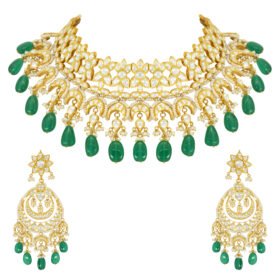
When it comes to purchasing jewelry, particularly gemstones and precious metals, understanding the terminology is crucial. Two frequently confused terms in the jewelry world are “carat” and “karat.” While they sound similar, they refer to completely different aspects of jewelry. In this blog, we’ll unravel the mystery behind carat and karat, and help you make informed decisions when shopping for exquisite jewelry.
Carat: Measuring Gemstone Weight
Carat, often abbreviated as “ct,” is a unit of measurement used to determine the weight of gemstones. One carat is equivalent to 200 milligrams, which is about the weight of a standard paperclip. In the world of gemstones, carat is used to assess the size and, to some extent, the value of a gem.
When buying gemstone jewelry, you’ll often see descriptions like “2-carat sapphire” or “0.5-carat diamond.” The carat weight significantly impacts the visual appeal and price of the gem. Larger carat weights tend to be more valuable, especially for gemstones like diamonds, rubies, and emeralds.
It’s important to note that carat weight doesn’t tell you anything about the gemstone’s physical dimensions or quality. Two gemstones with the same carat weight can look different in size and quality, so it’s essential to consider other factors like cut, color, and clarity.
Karat: Measuring Purity of Precious Metals
On the other hand, karat, often abbreviated as “K” or “kt,” is used to measure the purity of precious metals, such as gold. Karat indicates the percentage of pure gold in a piece of jewelry. The term is most commonly used for gold, but it can also apply to other metals like silver.
Pure gold is 24 karats, meaning it’s 100% gold with no other alloys. However, pure gold is relatively soft and not suitable for making durable jewelry. To strengthen and enhance the durability and appearance of gold jewelry, it is mixed with other metals like copper, silver, or nickel. The resulting alloy is what you wear as jewelry.
Common karat values for gold jewelry include 24K, 22K, 18K, 14K, and 10K. Here’s what they mean:
- 24K gold is pure gold, with no alloy.
- 22K gold is approximately 91.6% pure gold.
- 18K gold contains 75% pure gold.
- 14K gold is about 58.3% pure gold.
- 10K gold is around 41.7% pure gold.
The lower the karat value, the higher the percentage of alloy in the metal. While higher karat gold is more valuable, it’s also softer and more susceptible to damage. Jewelry with lower karat values is more durable but contains less pure gold.
Conclusion
In summary, when shopping for jewelry, understanding the difference between carat and karat is essential. Carat measures the weight of gemstones, while karat indicates the purity of precious metals like gold. Knowing the distinction between these two terms will help you make informed choices and select the perfect jewelry piece that suits your preferences and budget.
